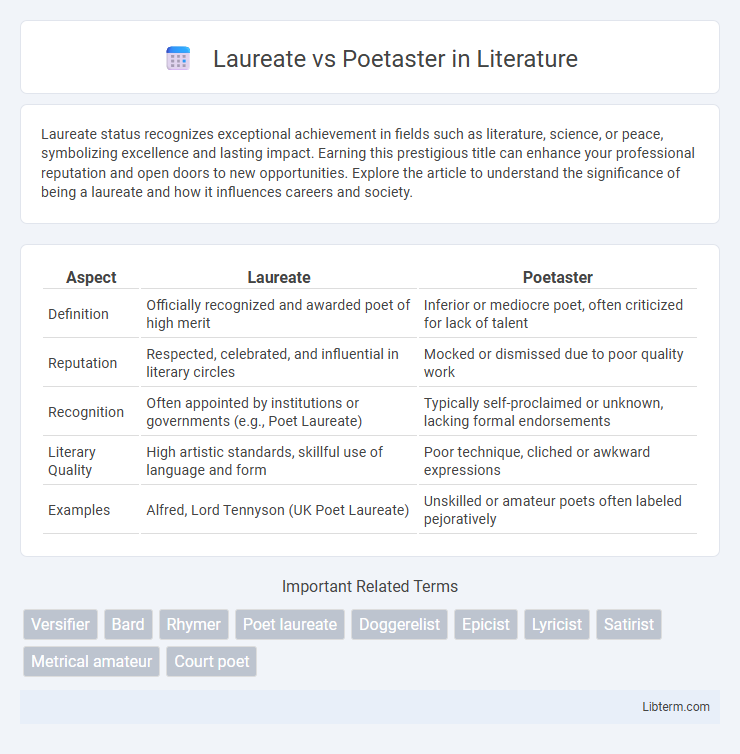Laureate status recognizes exceptional achievement in fields such as literature, science, or peace, symbolizing excellence and lasting impact. Earning this prestigious title can enhance your professional reputation and open doors to new opportunities. Explore the article to understand the significance of being a laureate and how it influences careers and society.
Table of Comparison
| Aspect | Laureate | Poetaster |
|---|---|---|
| Definition | Officially recognized and awarded poet of high merit | Inferior or mediocre poet, often criticized for lack of talent |
| Reputation | Respected, celebrated, and influential in literary circles | Mocked or dismissed due to poor quality work |
| Recognition | Often appointed by institutions or governments (e.g., Poet Laureate) | Typically self-proclaimed or unknown, lacking formal endorsements |
| Literary Quality | High artistic standards, skillful use of language and form | Poor technique, cliched or awkward expressions |
| Examples | Alfred, Lord Tennyson (UK Poet Laureate) | Unskilled or amateur poets often labeled pejoratively |
Understanding the Terms: Laureate and Poetaster
A Laureate is an officially recognized poet who has been honored for exceptional literary achievements, often appointed by a prestigious institution or government. In contrast, a Poetaster refers to a mediocre or inferior poet whose work lacks quality and artistic merit. Understanding these terms clarifies the distinction between celebrated literary excellence and subpar poetic efforts.
Historical Origins and Context
The term "laureate" originates from ancient Greece and Rome, where victors were crowned with laurel wreaths symbolizing honor and poetic excellence, deeply rooted in classical traditions. In contrast, "poetaster" emerged in the 16th century as a pejorative label for mediocre poets, reflecting the Renaissance emphasis on high literary standards and criticism. This historical divergence highlights societal values: "laureate" denotes celebrated mastery, while "poetaster" signifies inferior creativity within evolving literary contexts.
Defining Qualities of a Laureate
A laureate is distinguished by recognized excellence, often honored with prestigious awards or official titles celebrating their contributions to literature, art, or academia. Their work typically demonstrates high-quality craftsmanship, originality, and enduring influence, setting them apart from lesser-skilled or derivative creators like a poetaster. The defining qualities include mastery of language, cultural impact, and a respected position within literary or scholarly communities.
Characteristics of a Poetaster
A poetaster produces inferior or mediocre poetry characterized by lack of originality, poor craftsmanship, and forced rhyme schemes. They often imitate prominent poets without mastering poetic forms, resulting in verse that is cliched, unrefined, and lacking emotional depth. This contrasts with laureates, whose work demonstrates skillful use of language, creativity, and insightful expression.
Recognition and Literary Impact
Laureates receive widespread recognition for their exceptional contribution to literature, often awarded prestigious honors such as the Nobel Prize or Pulitzer Prize, solidifying their influence in literary history. Poetasters, by contrast, are often criticized for their lack of artistic merit and receive little to no acclaim, failing to make a significant impact on the literary canon. The enduring legacy of laureates shapes cultural discourse and inspires future generations, whereas poetasters remain largely obscure or derided.
Famous Laureates in Literary History
Famous laureates in literary history include poets such as Robert Frost, Seamus Heaney, and Pablo Neruda, all celebrated for their profound contributions to poetry and awarded prestigious honors like the Pulitzer Prize and Nobel Prize in Literature. In contrast, a poetaster refers to an inferior or mediocre poet whose work lacks the artistic quality and recognition held by laureates. The legacy of laureates is marked by enduring influence and critical acclaim, distinguishing them sharply from lesser-regarded poets.
Notorious Poetasters: Examples and Anecdotes
Notorious poetasters like William Topaz McGonagall, often cited as the worst poet in British history, consistently produced awkward verses that lacked poetic finesse, making them infamous in literary circles. Another example is Julia A. Moore, known as the "Sweet Singer of Michigan," whose sentimental yet clumsy poetry earned her notoriety for unintended humor rather than artistic merit. Anecdotes surrounding these figures highlight how their earnest yet flawed attempts contrast sharply with celebrated laureates, emphasizing the fine line between genuine poetic talent and notorious ineptitude.
Value of Craft vs. Pursuit of Fame
Laureates embody the value of craft, dedicating themselves to the mastery and refinement of poetic art, honoring tradition and literary excellence. Poetasters prioritize the pursuit of fame, often sacrificing depth and skill for quick recognition and popularity. The tension between these archetypes highlights the enduring conflict between artistic integrity and the allure of celebrity in literature.
Cultural Perceptions and Criticisms
Laureates are culturally perceived as exemplary poets distinguished by official recognition and lasting artistic merit, often celebrated for their contributions to literary heritage. Poetasters, conversely, are criticized as inferior or pretentious writers whose work lacks depth and artistic value, frequently dismissed by critics and scholars. This dichotomy shapes public and academic opinions, influencing how poetic achievements are valued and preserved across cultures.
The Enduring Relevance in Modern Literature
Laureate and poetaster represent contrasting literary statuses, where laureates are celebrated poets recognized for their exceptional contributions, while poetasters lack artistic merit and recognition. The enduring relevance of laureates in modern literature lies in their ability to inspire, shape cultural narratives, and uphold linguistic artistry across generations. Contemporary literary discourse continues to distinguish genuine talent from mediocrity by referencing these archetypes to evaluate poetic quality and influence.
Laureate Infographic

 libterm.com
libterm.com